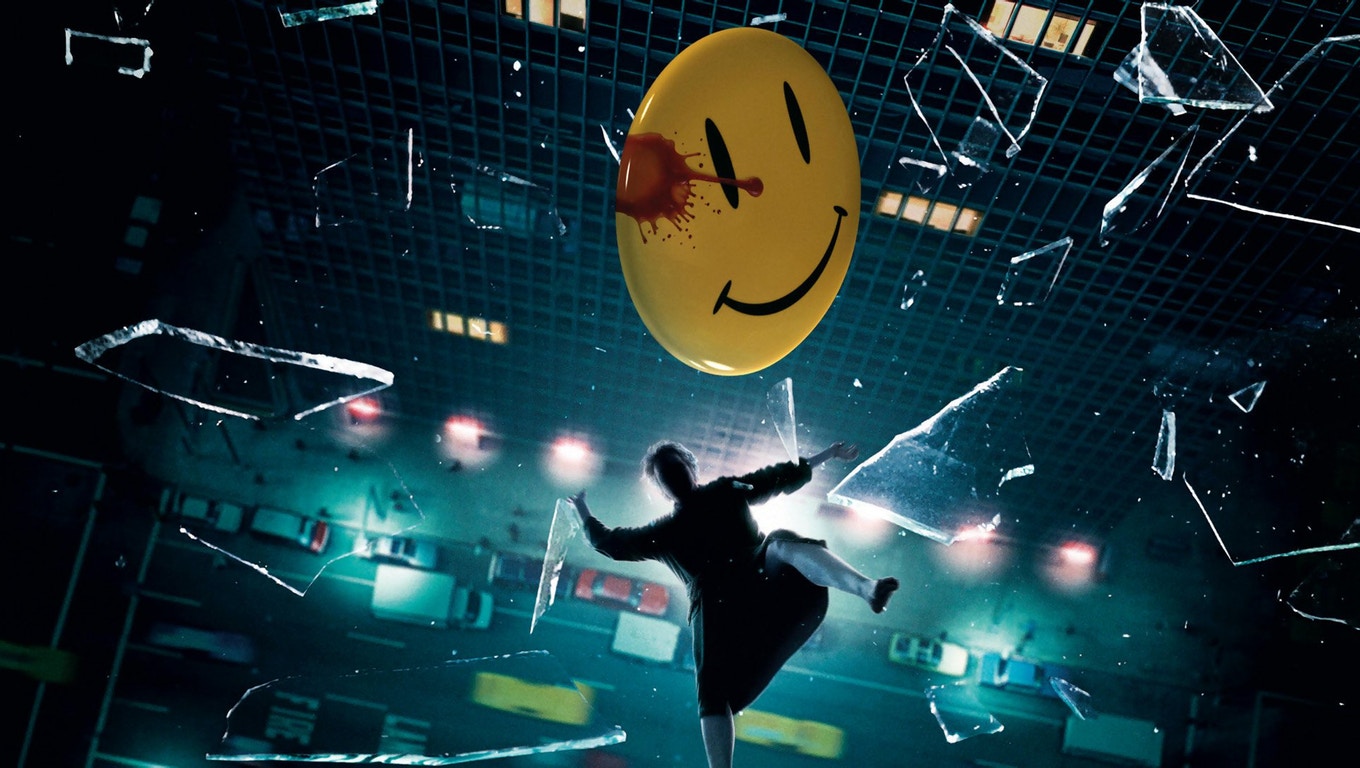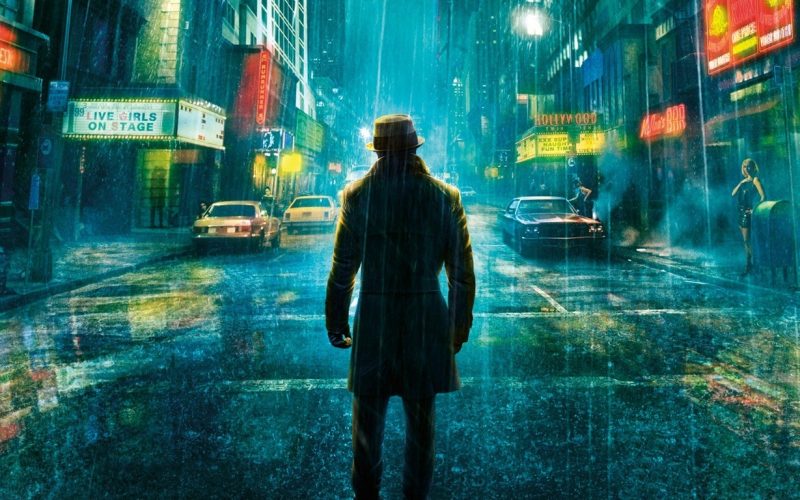Watchmen (2009).
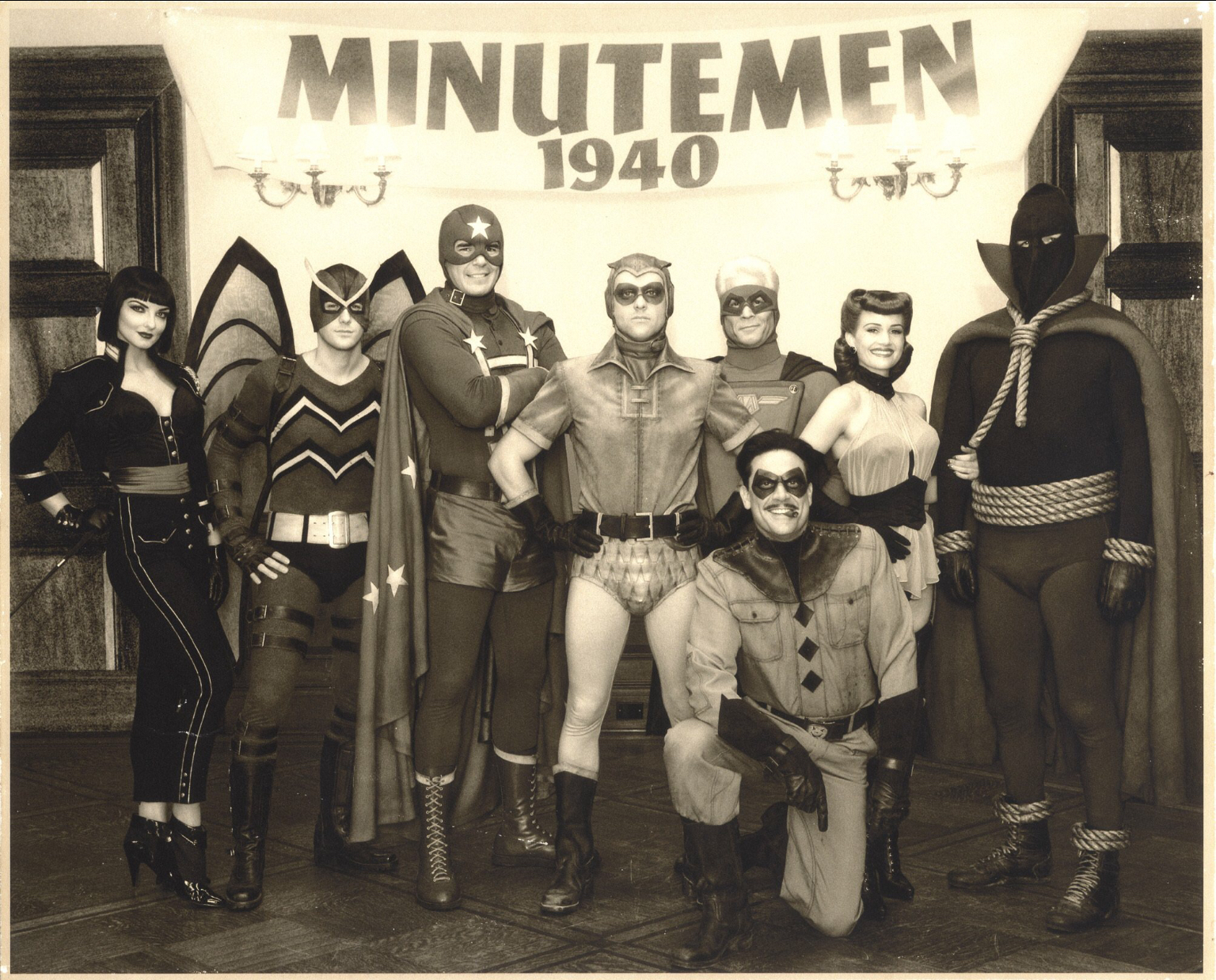
Rewatching The Watchmen.
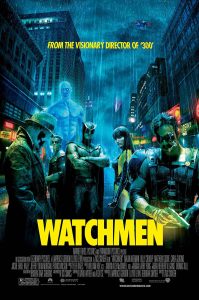 Love it or loathe it, we find ourselves in an age where the comic book movie has become the dominant genre in Hollywood. Filmed adaptations of almost every conceivable property have either been made, are being made or will be made over the next few years. Whether the bubble will burst on this phenomenon is unknown but whilst this trend has given us films of varying quality it’s also given us some true gems and whilst it has its detractors, for this writer at least, Zack Snyder’s 2009 adaptation of Alan Moore’s legendary graphic novel Watchmen is one of the very best.
Love it or loathe it, we find ourselves in an age where the comic book movie has become the dominant genre in Hollywood. Filmed adaptations of almost every conceivable property have either been made, are being made or will be made over the next few years. Whether the bubble will burst on this phenomenon is unknown but whilst this trend has given us films of varying quality it’s also given us some true gems and whilst it has its detractors, for this writer at least, Zack Snyder’s 2009 adaptation of Alan Moore’s legendary graphic novel Watchmen is one of the very best.
Even though the likes of Roger Ebert lauded it, Watchmen was met with a somewhat lukewarm reception from the majority of mainstream critics and commercially was seen as something of a flop for Warner Bros and Paramount. It’s hard to gauge overall how well such a film as Watchmen was received. Fans would have obviously seen it based on the books but to the uninitiated I can see Watchmen being an extremely difficult sell and it’s not hard to see why. It’s very self contained as both a book and a story, unlike the comic book adaptations that most Marvel and DC fans are used to, which are based on widely read source material with decades worth of established lore to mine for ideas.
For Zack Snyder, hot on the heels of another adaptation of a lesser known graphic novel, 300, the task of bringing Watchmen to the big screen seemed to be in good hands given the job he’d done on that film. That said, it still seemed like an incredibly tough task to pull off given the complex nature of the book but pull it off he did.
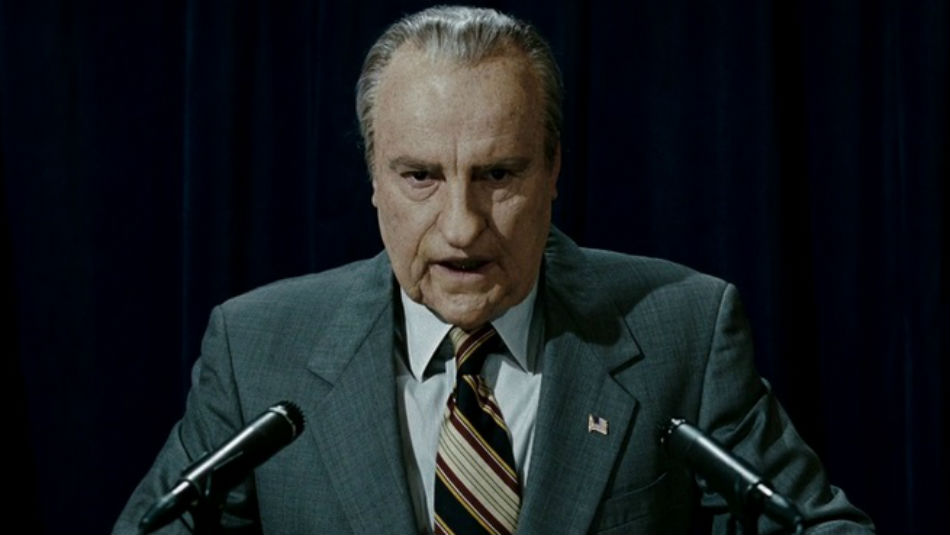
“I say when Doomsday is approaching!”
Watchmen tells the tale of an alternate USA circa 1985 where Richard Nixon never shamefully stood down as president after the Watergate scandal and here faces his fifth term in office and herein lies much of the story’s allure. It gets to comment, quite bluntly at times, on American political history in the 20th century whilst offering a dark parable as to what could have been if things had gone slightly differently in our own reality. Or, it could also be seen as a very prophetic story that’s more relevant than ever given the current political situation in the US.
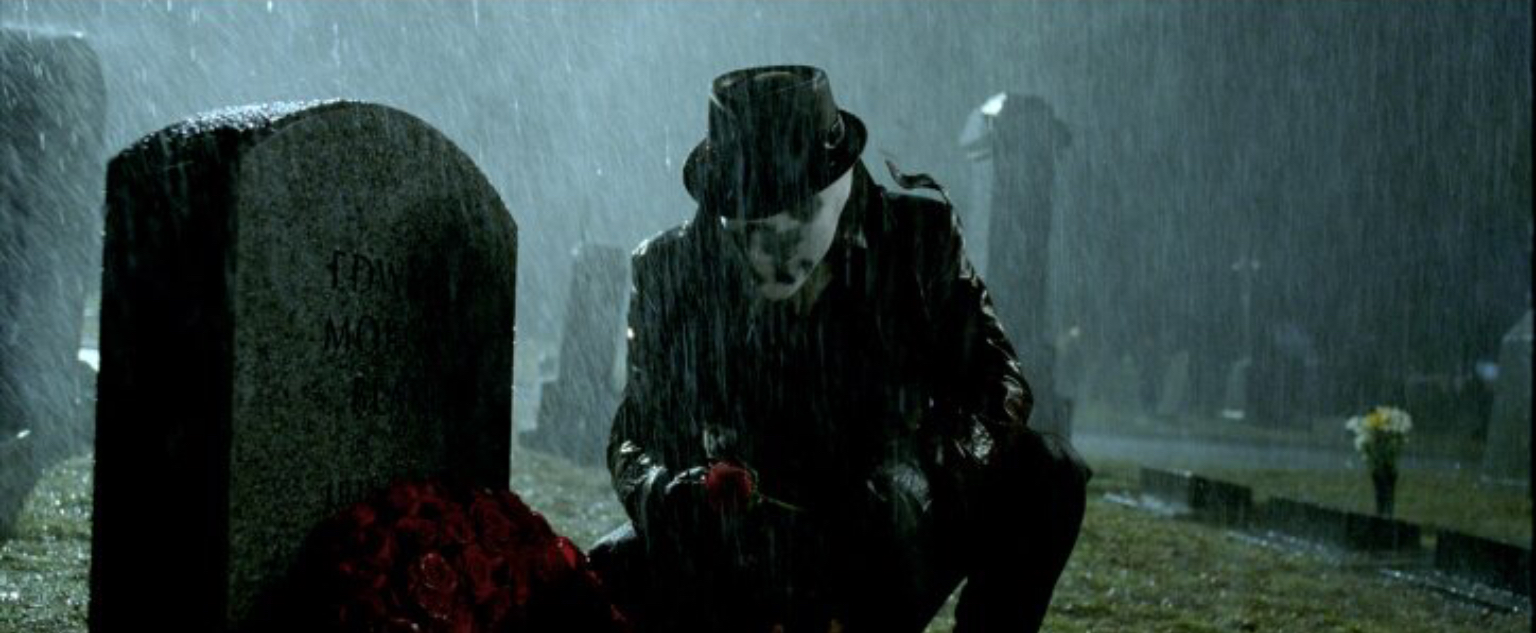
Aside from the socio-political differences, the main thing that marks this alternate world as being different from our own was the proliferation of masked criminals and in turn masked and costumed vigilantes throughout the 1940’s through to the late 1970’s whereupon Nixon made costumed crime fighting illegal. Watchmen’s complex story of the now underground crime fighters often employs a non-linear narrative to great effect. The most powerful of all the heroes is Dr Manhattan, a once normal scientist who, through a laboratory accident, gets disintegrated only to return as a super-powered being with the god-like ability to control matter at the most fundamental level. Dr Manhattan, in his near omnipotence, no longer sees time as being linear and this is in perfect keeping with the non-linear narrative of the book and film. Snyder never confuses things with his use of flashbacks yet never has to resort to the clumsy use of on-screen time stamps instead choosing to use other methods such as the date on a newspaper or a famous event or even just Manhattan’s own narration to tell us where we are chronologically.
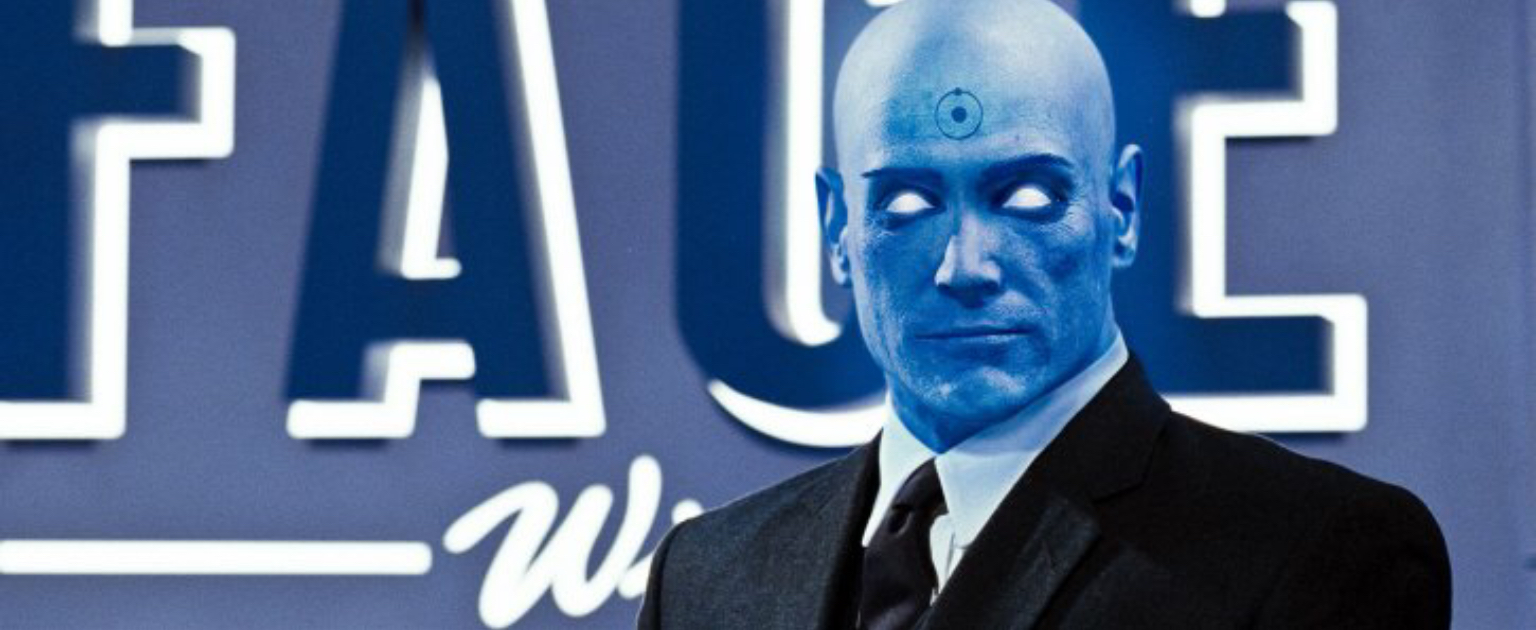
“I don’t think there is a God, and if there is, I’m nothing like him.”
Watchmen begins with a violent burglary on one of our retired heroes that becomes the catalyst for the story that follows. This scene then segues into a truly remarkable opening credits sequence where we are given a visually rich overview of the costumed heroes of yesteryear, charting their rise and subsequent fall. It’s a mesmerising opening and is perfectly paired with Bob Dylan’s “The Times They Are A-Changin’”. It gives us brief but very satisfying glimpses at alternate takes on our own history, such as JFK’s ‘real’ assassin. Other playful alternate history nods are peppered throughout the film. We’re shown an alternate version of Apocalypse Now’s famous helicopter attack on the Viet Cong accompanied by “Ride of the Valkyries”. The Comedian makes reference to having “had fun” with Woodward and Bernstein, the crusading journalists who would, in our world at least, bring about the downfall of President Nixon, the film’s true antagonist. In this alternate America it seems Nixon used The Comedian’s talents to keep them quiet.
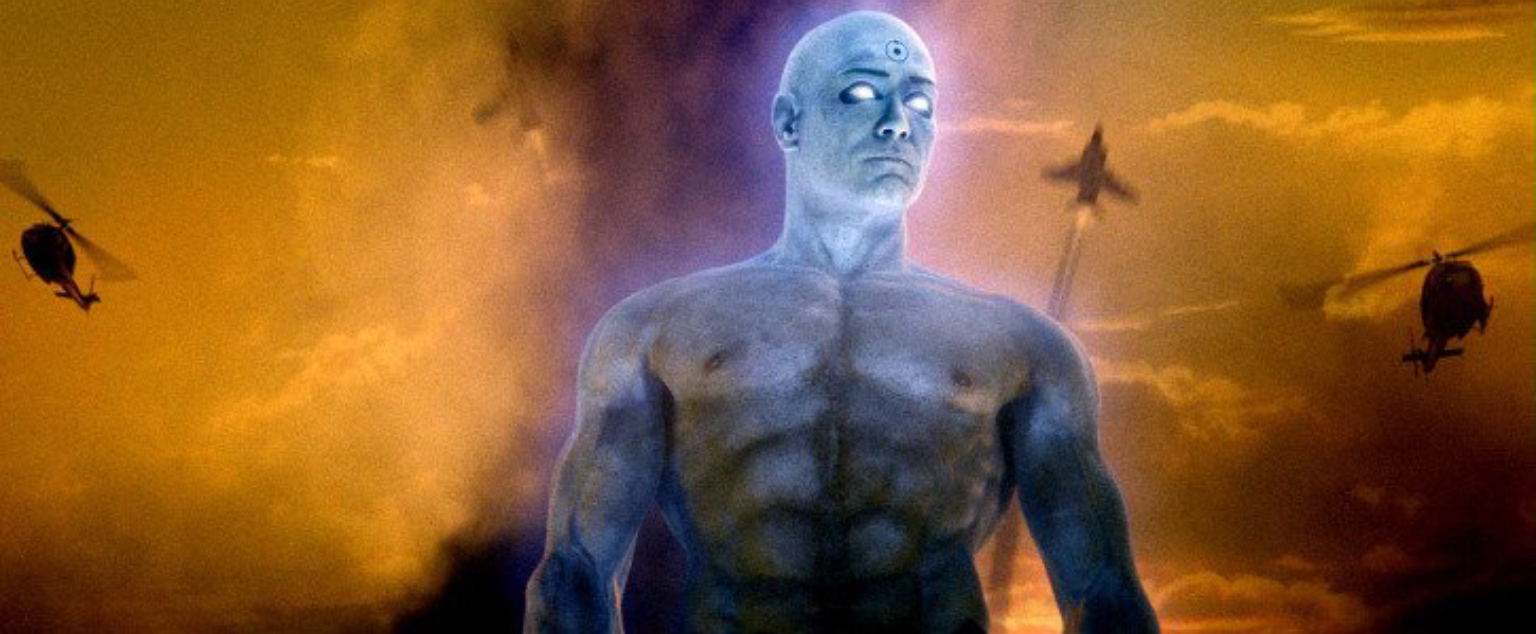
Watchmen has layer upon layer of depth, both to the narrative, the world it depicts and the characters that occupy it. Much of this depth was inherent in the source material but Snyder and screenwriters David Hayter and Alex Tse add even more depth by expanding on scenes and not just translating the graphic novel’s speech bubbles verbatim. Each and every main character, of which there are several, are given substantial screen time through which to flesh them out. Take Edward Blake, The Comedian for instance, a wonderfully cast Jeffrey Dean Morgan. Even though his taken name would suggest he’s the once clownish wildcard of The Watchmen, if anything, he’s the ultimate cynic. As Rorschach describes him in one of his many pieces of narration, “Blake saw society’s true face and chose to be a parody of it, now a joke.”
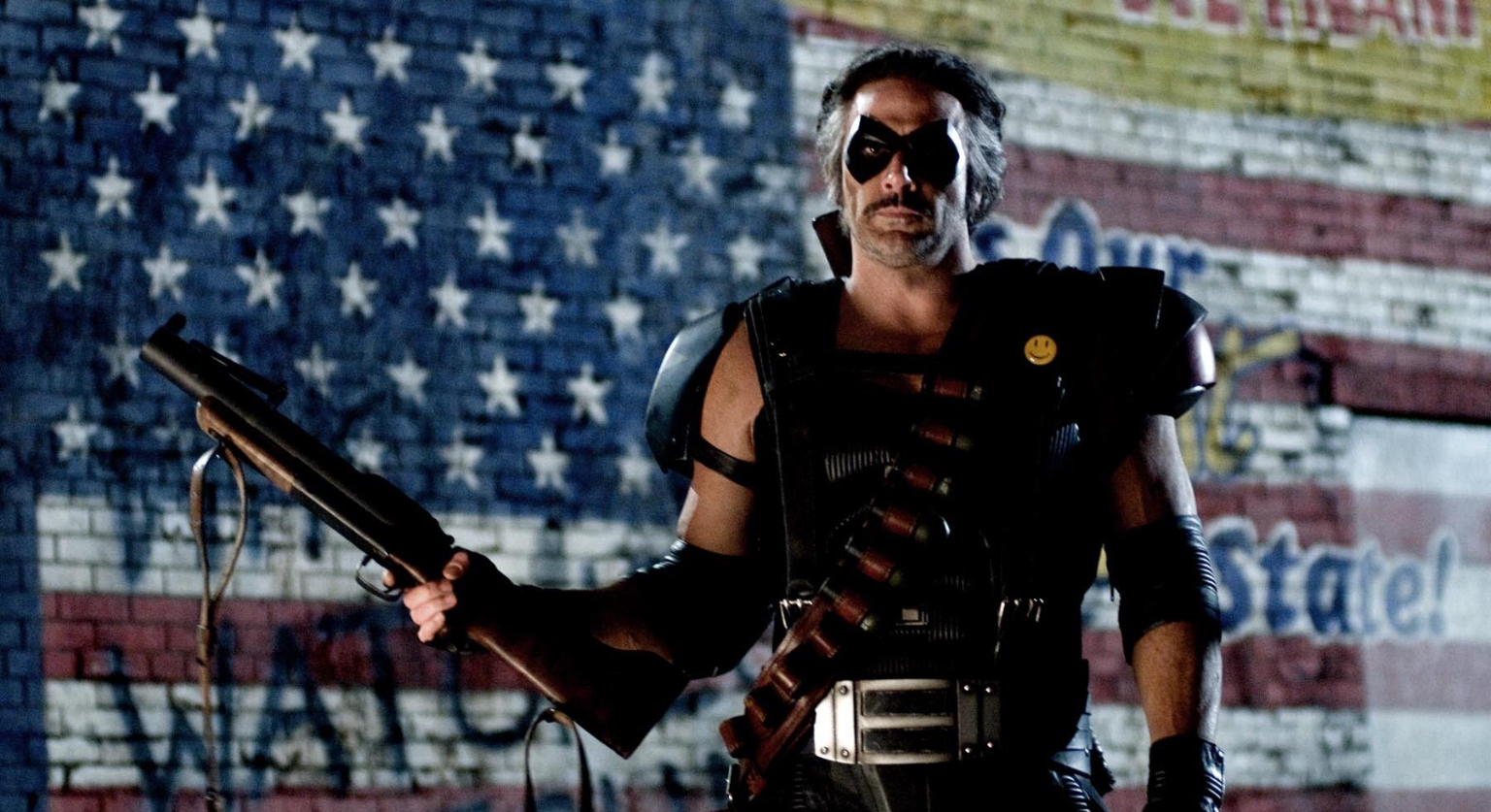
“What happened to the American Dream? It came true. You’re lookin’ at it.”
Arguably the heart and twisted soul of the film is Rorschach, the vigilante who wears a black and white mask and sees the world in the same black and white way, good and evil with nothing in between. His simple sense of right and wrong at odds with that of the film’s ultimate antagonist who will take the most logical approach to saving the world from annihilation even if it means the death of millions.
Technically the film is astounding in almost every conceivable aspect be it costumes, production design, or art direction. Every frame is a work of art, often closely copying panels from the book. Larry Fong’s amazing cinematography gives the stunning sets and rain soaked locales a haunting, neon lit, noir-like beauty. Composer Tyler Bates, whose score would add so much atmosphere and colour to Marvel’s Guardians of the Galaxy five years later, is on top form here. His score flits between sombre melancholy and epically rousing with deft aplomb.
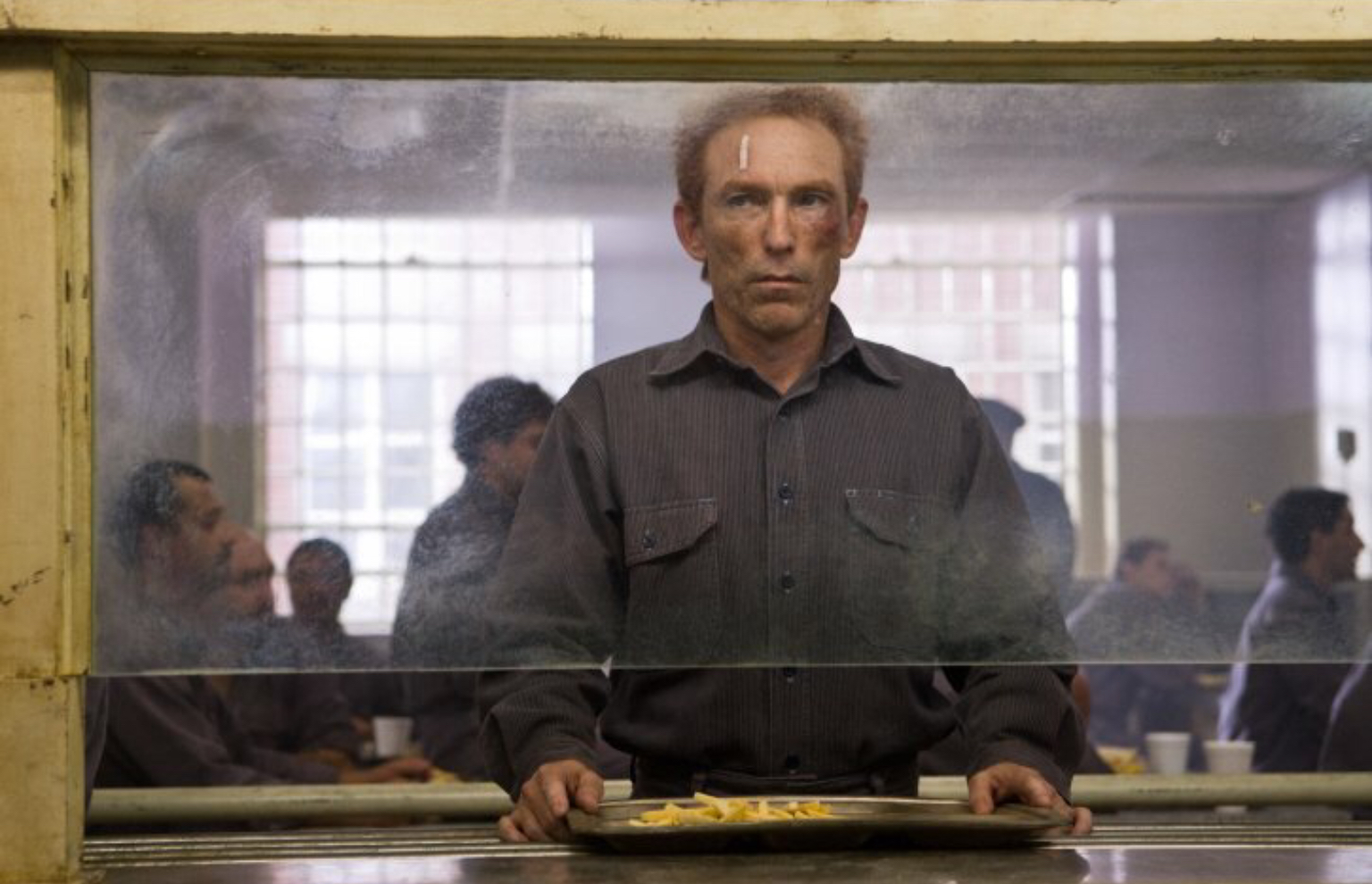
“None of you seem to understand, I’m not locked in here with you, you’re locked in here with me!”
The editing in Watchmen is flawless. The alleyway fight sequence, where a rusty Nite Owl and Silk Spectre take on a gang of thugs is one of many stunningly choreographed fight scenes and is perfectly intercut with Dr Manhattan’s doomed TV interview, Tyler Bates’ score building to a satisfying crescendo as the drama unfolds. This is immediately followed by a sublime 10 minute sequence showing Dr Manhattan’s origin, a story within a story if you will, and one that perfectly captures the tone of the book and is chock-full of thought provoking musings on humanity’s concept of time. Every time I watch the film I find something new that I hadn’t seen before. Watchmen is so rich in detail and layered depth that it constantly rewards repeat viewings. Even the changes from the book that Snyder made work perfectly. Many of the hardcore fans of Alan Moore’s book lambast the decision to omit the giant octopus, a change that, for me, works as that was one of Moore’s more out-there creations that just wouldn’t have successfully translated to the big screen. What we got in its place seems far more in keeping with the Cold War fear of nuclear annihilation.
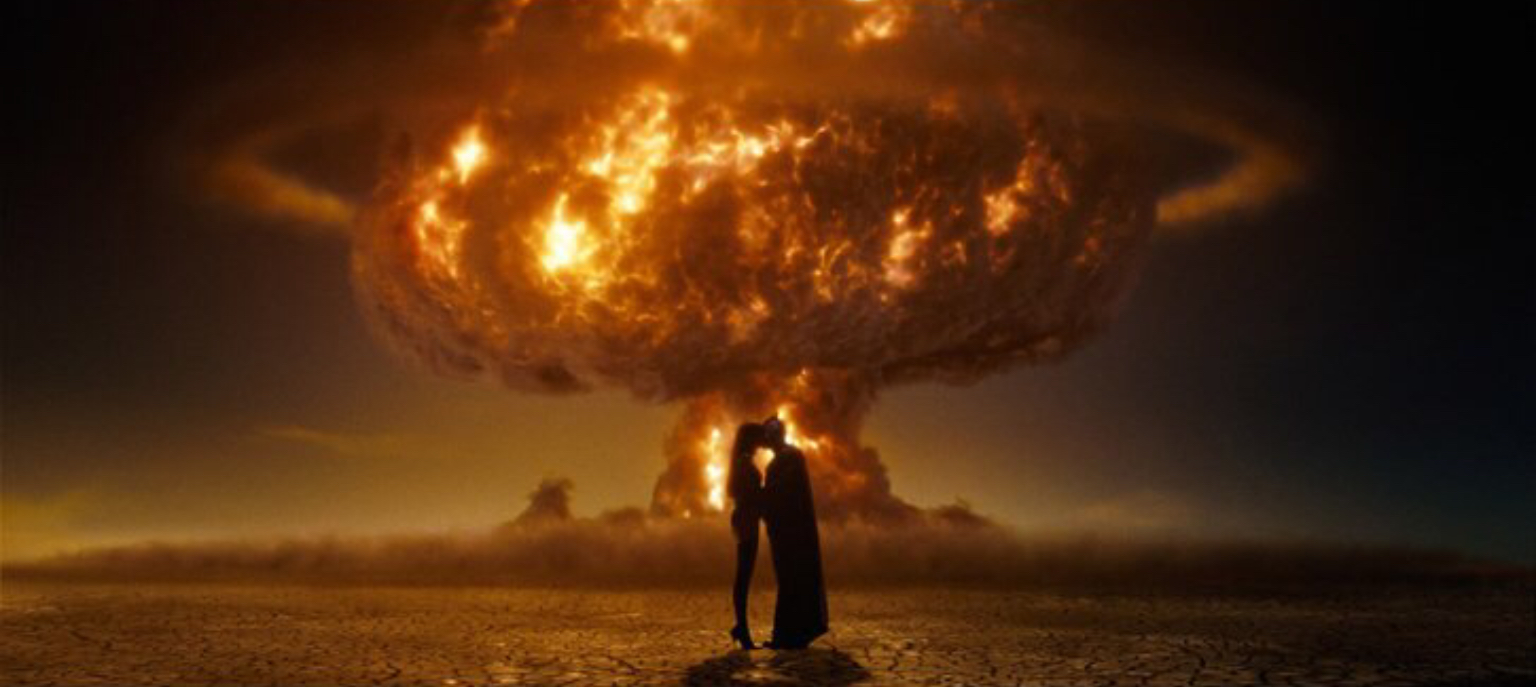 There are three versions of Watchmen currently available, each one different enough to warrant your consideration and time. The 162 minute Theatrical Cut is perfectly fine and will be the version seen by most casual fans but loses out on some of the character depth of the other two versions. The 186 minute Director’s Cut is the version I’ve based this review on and is by far my preferred version, those 24 additional minutes adding immeasurably to the film. The 215 minute Ultimate Cut takes the Director’s Cut and adds in the previously standalone Tales Of The Black Freighter animated short and distributes it in bite size chunks throughout the film as it was in the original books. It’s an interesting experiment in adhering as closely as possible to Moore’s original work but for me the supposed parallels between the tale of a doomed sea captain, voiced by Gerard Butler, and the story told in the film just aren’t that clear and I found the animated sections jarring and they pulled me out of the film I was enjoying so much. Kudos to Snyder for trying but The Ultimate Cut’s additions over the Director’s Cut are like touching up the Mona Lisa and detract from the overall experience.
There are three versions of Watchmen currently available, each one different enough to warrant your consideration and time. The 162 minute Theatrical Cut is perfectly fine and will be the version seen by most casual fans but loses out on some of the character depth of the other two versions. The 186 minute Director’s Cut is the version I’ve based this review on and is by far my preferred version, those 24 additional minutes adding immeasurably to the film. The 215 minute Ultimate Cut takes the Director’s Cut and adds in the previously standalone Tales Of The Black Freighter animated short and distributes it in bite size chunks throughout the film as it was in the original books. It’s an interesting experiment in adhering as closely as possible to Moore’s original work but for me the supposed parallels between the tale of a doomed sea captain, voiced by Gerard Butler, and the story told in the film just aren’t that clear and I found the animated sections jarring and they pulled me out of the film I was enjoying so much. Kudos to Snyder for trying but The Ultimate Cut’s additions over the Director’s Cut are like touching up the Mona Lisa and detract from the overall experience.
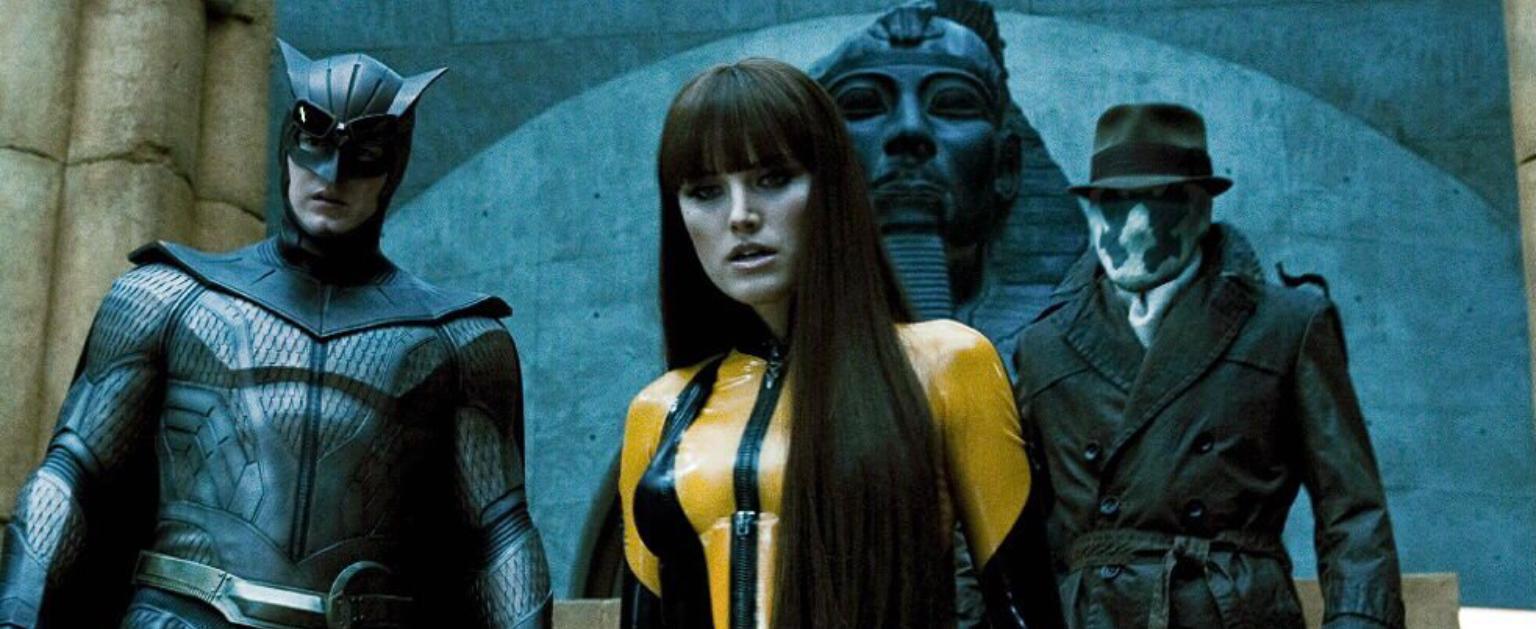
Adapting Watchmen was a monumental task for Zack Snyder to undertake and really should never have worked as a film. The original book was very much a product of the ‘80s with it’s themes of Cold War paranoia yet the film still manages to feel more culturally relevant than ever. It’s gaudy looking heroes who, on the surface, look to be parodies of characters from the golden age of comics are anything but and the whole thing works more as a love letter to superhero comics. Any camp visual element is more than countered by the extremely dark tone and often shocking, graphic violence.
As Snyder embarks on yet another monumental comic book adaptation in DC’s forthcoming Justice League, following his somewhat disappointing Batman V Superman: Dawn Of Justice, I can only hope he’s as successful with this new film as he was here. Watchmen is easily his best work to date, a flawless adaptation of a book thought by many to be unfilmable and a movie that I feel is very much an underrated classic and one that gets my highest recommendation.
Film ‘89 Verdict:
Theatrical Cut – 9/10
Director’s Cut – 10/10
Ultimate Cut – 8/10
